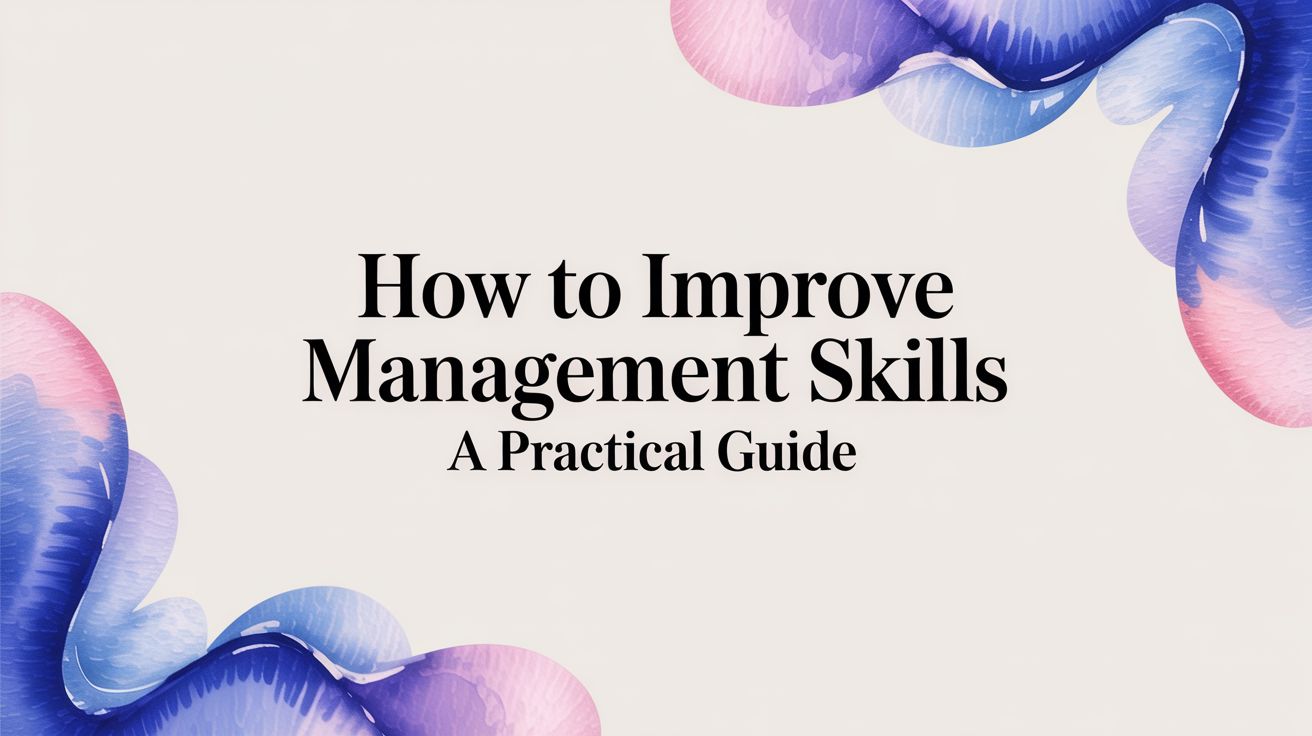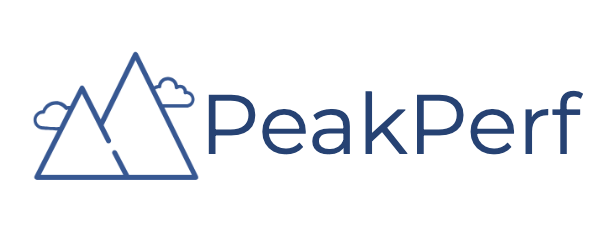How to Improve Management Skills: A Practical Guide

Becoming a better manager is an active process. You must look at your own performance, identify what you do well and where you fall short, and then intentionally practice core skills. Practicing skills like giving solid feedback or delegating tasks without micromanaging is the only way to build confidence and see measurable improvement.
Your Path to Better Management Starts Here
Becoming a great manager does not happen by accident. It requires a deliberate, focused effort on the specific behaviors that move your team forward.
Many managers feel stuck and do not know where to start. The solution is to stop trying to change everything at once. You only need to master a few high-impact skills that create the biggest effect on your team's success.
This guide is your playbook. We will walk through how to be honest about your strengths and weaknesses. Then, you can turn those insights into a real development plan. It is all about action. The short version is this: leadership is a skill you build through repetition, not something you are born with.
Identifying Your Core Focus Areas
To get better, you first need to know where to direct your energy. My experience shows that three areas consistently challenge new and veteran managers. These areas also offer the biggest opportunities for growth.
- Giving Effective Feedback: Too many managers avoid giving feedback or deliver it so poorly that it creates confusion and defensiveness. Mastering a simple, structured way to give clear, constructive feedback will change your approach.
- Delegating for Growth: Real delegation is not just about assigning tasks. It is about empowering your people, trusting them to deliver, and using it as a tool to build their skills. This frees you up to focus on higher-level work.
- Navigating Difficult Conversations: Talking to someone about underperformance or a bad attitude is one of the toughest parts of the job. Learning how to handle those moments with calm and confidence is critical for a healthy team.
Your Core Management Skills Assessment Checklist
Use this checklist to self-assess your proficiency across key management areas. Rate yourself honestly to identify your biggest opportunities for growth.
| Management Skill Area | Beginner (Needs significant development) | Intermediate (Comfortable with basics) | Advanced (Consistently effective) |
|---|---|---|---|
| Giving Corrective Feedback | I avoid it or deliver it in a way that feels confrontational. | I give basic feedback but struggle with difficult reactions. | I deliver clear, actionable SBI feedback and handle reactions calmly. |
| Giving Positive Reinforcement | I rarely give praise or it comes across as generic. | I give praise but do not always tie it to specific behaviors. | I consistently recognize specific actions and their impact, motivating my team. |
| Running Effective 1-on-1s | My 1-on-1s are unstructured status updates or frequently canceled. | I have regular 1-on-1s but they lack a clear focus on development. | My 1-on-1s are strategic coaching sessions focused on goals, growth, and removing blockers. |
| Delegating Tasks & Projects | I tend to do things myself or micromanage when I delegate. | I delegate tasks but do not always provide full context or autonomy. | I delegate for growth, providing clarity, resources, and trust to empower my team. |
| Handling Difficult Conversations | I put off addressing underperformance or team conflict. | I address issues but feel highly anxious and unprepared. | I confidently and calmly navigate tough conversations, focusing on solutions. |
| Setting Clear Goals (for Team) | Team goals are vague, unmeasurable, or disconnected from company objectives. | I set goals, but they are not always SMART (Specific, Measurable, etc.). | I collaborate with my team to set clear, ambitious, and measurable goals. |
Once you complete the checklist, a few areas will stand out. Do not feel overwhelmed. Pick one or two "Beginger" areas to focus on first. That is your starting line.
Assess Your Current Skills with a Reality Check

Before you can build new skills, you need an honest picture of where you stand. Too many managers guess at their own effectiveness. Without real data, you are flying blind. A solid self-assessment is the only way to build a development plan that works.
The goal is to get past your own assumptions. You need to pinpoint the specific behaviors that are helping your team thrive and the ones that are holding them back. Once you know that, you can focus your energy where it will make the biggest difference.
Start with Honest Self-Reflection
Before you ask anyone else, take a hard look at your own actions. This is not about being self-critical. It is about being accurate. Think back over the last few weeks and months. How did you handle key situations?
Ask yourself some tough, behavior-focused questions:
- When was the last time I gave a team member specific, positive feedback?
- How do I react when a project is late? What is my go-to response?
- Do my direct reports bring me problems, or do I find out about them when it is too late?
- Am I delegating tasks to grow my team's skills, or am I just offloading the work I do not want to do?
These questions force you to think about what you did, not what you intended to do. Write down your answers. This gives you a personal baseline to work from.
Gather Anonymous Feedback for a 360-Degree View
Your self-assessment is one piece of the puzzle. The most useful insights will come directly from your team. Their perspective reveals the true impact of your management style. You must make it completely safe for them to tell you the truth.
Anonymous feedback is non-negotiable.
A common mistake is assuming you know how your team perceives you. Anonymous surveys bridge the gap between your intent and your actual impact, providing the unvarnished truth you need to grow.
You do not need fancy software. A simple survey in Google Forms works perfectly. Keep it short and focused on things people can observe. This stops the feedback from feeling personal and keeps it actionable.
Here are a few questions you can include:
- On a scale of 1 to 5, how clear are the goals and expectations I set for projects?
- Do you get enough constructive feedback to help you grow in your role?
- How comfortable do you feel bringing up a problem or a difficult topic with me?
- What is one thing I can start doing to better support you and the team?
- What is one thing I should stop doing?
Make it clear that every single response is anonymous. You must mean it. Once the results are in, resist the urge to focus on outlier comments. Instead, look for the themes that appear again and again.
Analyze Your Findings and Pinpoint Priorities
You now have two sets of data: your own reflection and your team's anonymous feedback. Lay them side-by-side. Where do they line up? More importantly, where are the disconnects?
Maybe you thought you were a great communicator, but the feedback says your instructions are confusing. That is not a failure. That is a breakthrough. You have found a massive opportunity for growth.
To make sense of it all, group the feedback into core skill categories:
- Communication: Clarity of instructions, goal setting, running meetings.
- Feedback: Quality, frequency, and balance of positive and corrective input. Our guide on the SBI feedback model offers a great framework for this.
- Delegation: Trust, autonomy, and providing proper context.
- Support: Availability, empathy, and removing obstacles for your team.
This simple act of organizing turns a pile of comments into a clear roadmap. You might find you are great at supporting your team but terrible at delivering tough feedback. That is exactly the clarity you need to build a targeted improvement plan, which we will address next.
This level of self-awareness is directly linked to better leadership. A study by Exec Learn found that companies prioritizing leadership development see 25% better business outcomes. The same study showed trust in managers dropped from 46% to 29% in a recent two-year span, highlighting a crisis in effectiveness that often starts with a lack of self-awareness. Learn more about the impact of leadership development on business results.
You have done the hard work of assessing your skills. Now you have a clear picture of where you are and where you need to go. That self-assessment is just an interesting thought exercise unless you turn it into a concrete plan.
This is where you build your roadmap. A solid development plan turns good intentions into scheduled, non-negotiable actions. It focuses your limited time and energy on the skills that will have the biggest impact on your team's performance and their happiness at work.
Stop Setting Vague Goals, Get SMART Instead
Goals like "get better at feedback" are useless. They feel good to write down, but you can never cross them off a list because you have no idea what "better" looks like.
To make your goals stick, you need to make them SMART. This simple framework forces you to add the detail that separates wishful thinking from a real plan.
- Specific: What, exactly, are you going to do? What behavior will change?
- Measurable: How will you know you are making progress? What does success look like?
- Achievable: Is this realistic right now, with your current workload?
- Relevant: Does this directly address a weakness you found in your self-assessment?
- Time-bound: What is the deadline? When will you get this done?
Let us see what this looks like in practice. We will take a common, fuzzy goal and make it real.
Instead of: "I need to improve my feedback skills."
Try this: "For the next quarter (Time-bound), I will deliver specific, SBI-based feedback (Specific) to each of my five direct reports during our bi-weekly one-on-ones (Measurable). I will track this in my notes and I am aiming for a 100% completion rate (Achievable). This directly addresses the team's survey comments about needing more direct guidance on their performance (Relevant)."
See the difference? The second version is a real commitment. You know exactly what to do, when to do it, and what winning looks like.
Build Your Learning and Practice Schedule
Goals are the destination, but you still need a map to get there. The next step is to figure out how you are going to learn and then schedule the time to practice. The best plans mix a few different learning styles to keep things fresh and help you apply new ideas right away.
Find Mentors Who Are Already Great at This
Look around your organization. Identify one or two leaders who are pros in the areas you want to grow. Perhaps it is a director who handles difficult conversations with grace or a peer whose team is always innovating.
Ask them for 30 minutes a month. Do not waste their time. Come to these chats prepared with real situations you are struggling with and ask them directly: "How would you have handled this?"
Curate Your Learning, Do Not Boil the Ocean
You do not need to read an entire library on management theory. Pick one great book or a few high-quality articles that focus squarely on your target skill. The point is not to become an expert overnight. The point is to absorb a couple of concepts and put them into practice this week.
Here is a simple way to structure your plan for each goal:
| Goal Area | SMART Goal | Learning Resource | Practice Activity | Check-in Cadence |
|---|---|---|---|---|
| Delegation | Delegate one low-risk project per week for one month, defining outcomes instead of tasks. | A specific chapter from a trusted management book on delegation. | Identify and delegate a task in Monday's team meeting. | Review progress in Friday's self-reflection session. |
| Difficult Conversations | Initiate one overdue conversation about performance with a direct report by the end of the month. | Role-play the conversation with a trusted peer or mentor. | Prepare a script with key talking points and schedule the meeting. | Debrief with mentor within 48 hours of the conversation. |
The Most Important Step: Get It on the Calendar
If you do not schedule it, it will not happen. This is the single most critical part of the process. Urgent tasks and unexpected problems will always crowd out important but not urgent work like your own development. Your good intentions will evaporate by Wednesday.
Treat your own growth like you would any other mission-critical project.
- Block one hour on your calendar every single week. Call it "Management Development." Use this time to read, watch a video, or prep for a practice run.
- Schedule your mentor check-ins for the whole quarter right now. Get them on the books.
- Put practice activities on your to-do list or calendar. A simple reminder on Thursday morning that says, "Prep SBI feedback for one-on-one" can make all the difference.
When you put these things on your calendar, you are making a real commitment to yourself and your team. Your plan stops being a static document and becomes a living part of how you work.
Mastering Your Core Management Skills
Knowing where you need to improve is one thing. Turning that knowledge into action separates great managers from the rest. The skills we are about to cover are not theories. They are the day-to-day tools you will use to guide, develop, and support your team.
These skills are not just nice-to-haves anymore. The World Economic Forum’s Future of Jobs Report predicts that nearly 40% of workers’ core skills will shift by 2030. Things like empathy, active listening, and solid resource management are taking center stage alongside tech skills. These are the building blocks of effective feedback, delegation, and communication. You can read more about the future skills outlook from the World Economic Forum.
Think of this section as your playbook. You will get scripts, templates, and simple weekly exercises designed to build your confidence and weave these skills into your natural leadership style.
Giving Feedback That Helps
Giving constructive feedback can be uncomfortable. Many managers sidestep it because they are afraid of confrontation or do not know what to say. The secret is to take your personal opinion out of the equation and focus only on observable behaviors. A simple, structured model is your best friend here.
The Situation-Behavior-Impact (SBI) model is effective for this. It is a straightforward framework that keeps your feedback objective and pointed toward a solution, not a personal critique.
- Situation: First, you ground the conversation in a specific moment. When and where did this happen?
- Behavior: Next, you describe the exact, observable action. No interpretations or judgments about their intent, just what you saw or heard.
- Impact: Finally, you explain the direct consequence of that behavior on you, the team, or the project.
This structure keeps the conversation from feeling like an attack and turns vague criticism into a tangible observation the person can use.
Giving feedback should feel less like a judgment and more like holding up a mirror. Your goal is to show a team member the specific impact of their actions so they can choose to adjust.
Example SBI Script in Action
Imagine a team member, Alex, has a habit of interrupting people in meetings. Here is how you can frame the feedback using SBI.
- Situation: "Alex, in our team meeting this morning when Sarah was presenting the Q3 numbers..."
- Behavior: "...I noticed you jumped in with your own ideas three times before she finished walking us through a slide."
- Impact: "The impact was that Sarah seemed to lose her train of thought, and we never got to hear her full analysis, which put us a bit behind on making a decision."
See how that works? It is direct, factual, and focuses on the outcome. You can find more tactics for these kinds of discussions in our guide on achieving clear communication with your team.
Weekly Practice Exercise
This week, pick one piece of positive behavior and one area for improvement on your team. Write out SBI feedback for both, and then deliver it during your next one-on-one.
Delegating Tasks for Team Growth
Great delegation is not about getting things off your plate. It is one of the most useful tools you have for developing your people and building their confidence. The best managers I know delegate outcomes, not processes.
This means you clearly define what success looks like but give your team the autonomy to figure out how to get there. It is a subtle shift, but it is the difference between assigning a task and building ownership.
Your Pre-Delegation Checklist
Before you hand off that next task, run through these questions. It will take you two minutes, but it is the key to setting your team member up for a win.
- Is the outcome crystal clear? Have I defined what "done" looks like with specific, measurable criteria?
- Why does this matter? Do they understand how this task connects to the bigger team or company goals?
- What is their authority level? Are they clear on which decisions they can make on their own versus when they need to loop me in?
- What resources do they have? Do they know who to talk to or where to find the info they will need?
- How will we check in? Have we agreed on a check-in cadence that feels supportive, not like micromanagement?
Weekly Practice Exercise
Find one task this week you would normally do yourself. Use the checklist to delegate it to someone who can grow from the experience. Make your focus the "what" and the "why," and then give them the space to own it.
Running Productive One-on-One Meetings
Your one-on-ones are the most important meetings on your calendar. Period. They should be strategic coaching sessions focused on growth and challenges, not just a verbal status update.
A simple, consistent agenda is the key. I am a fan of using a shared document that both you and your direct report can add to beforehand. It guarantees you both show up prepared for a real conversation.
Sample One-on-One Agenda Template
- Their Topics (20 minutes): This always goes first. Give them the floor. What is on their mind? What is blocking them? What wins do they want to share?
- Your Topics (10 minutes): Now it is your turn. This is your space for feedback, discussing priorities, or sharing team-wide updates.
- Development and Goals (15 minutes): Zoom out. How are they tracking toward their professional goals? What new skills are they excited about building? How can you help?
- Action Items (5 minutes): Quickly recap the key takeaways and assign clear next steps for both of you before you wrap up.
Weekly Practice Exercise
Roll out this shared agenda for your one-on-ones next week. Before each meeting, add at least one open-ended coaching question to the "Development and Goals" section. Think along the lines of, "What part of your work is most energizing you right now?" or "What is one skill you would like to be known for a year from now?"
Navigating Difficult Conversations
Tough conversations about underperformance or behavioral issues are part of the job. Your ability to handle them with clarity and empathy makes or breaks you as a leader. Preparation is everything.
Walking into these conversations without a plan is a recipe for disaster. You need to know your objective, anticipate how they might react, and stay focused on the issue at hand.
A Simple Framework for Tough Talks
- State your intention. Kick things off with a neutral purpose statement. "I would like to talk about what happened with the client report deadline."
- Describe the gap. Clearly state the difference between the expectation and the reality, using specific examples. "The expectation was that the report would be sent by EOD Tuesday. It was submitted on Thursday morning."
- Listen to their perspective. After you have stated the facts, ask an open-ended question and then listen. "Can you walk me through what happened from your side?"
- Collaborate on a solution. Do not dictate the next steps. Work together to define a clear, actionable plan for improvement. "What support do you need to make sure this does not happen again? Let us agree on a new plan."
- Set a follow-up. End by scheduling a specific time to check in on their progress. This sends a message that you are invested in their success.
Weekly Practice Exercise
Think of a tough conversation you have been putting off. Use this five-step framework to script your opening lines and key talking points. If you can, practice it with a trusted peer or mentor before you schedule the real meeting.
Prioritizing Your Well-Being to Lead Effectively
Let us start with a simple truth: you cannot pour from an empty cup. This is not a fluffy self-help statement. It is the foundation of sustainable leadership. Trying to lead a team when you are running on fumes, stressed out, and overwhelmed is a recipe for disaster.
Your well-being is not a luxury item on your to-do list. It is a non-negotiable part of being an effective manager. When you are stressed, that pressure bleeds into everything: your team dynamics, how you communicate, and overall morale. Your ability to give clear feedback, handle a tough conversation, or inspire your team is directly tied to your own mental and emotional state.
The Direct Link Between Your Stress and Team Performance
Your stress is contagious. When you are consistently overworked and anxious, your team feels it. It shows up in subtle ways, like micromanagement, delayed decisions, or snappy, irritable communication. Before you know it, that tension erodes trust and creates a toxic environment where people are afraid to take risks or make mistakes.
This is not just a feeling. It has real, bottom-line consequences. The DDI Global Leadership Forecast found that 40% of leaders are thinking about quitting their jobs to improve their own well-being. That statistic alone should tell you that managing your own stress is a critical competency for your own career and for keeping good leaders in the organization. You can read more about the connection between well-being and leadership success.
Practical Strategies for Managing Your Workload
To avoid burnout, you have to be proactive about managing your energy, not just your time. This means setting real boundaries and building a structure for your work that protects your focus. If you do not, the demands of the job will always expand to fill every available second.
Here are a few tactics you can start using today:
- Block Your Calendar for Deep Work: Schedule unbreakable appointments with yourself for focused work. This is the only way to stop your entire day from turning into a series of back-to-back meetings and constant interruptions.
- Define Your "End of Day" Ritual: Create a clear routine that signals your brain it is time to shut down. This can be as simple as clearing your to-do list for the next day, tidying your desk, or closing your laptop and putting it in your bag. It creates a psychological break between your work life and your personal life.
- Practice Strategic Disconnection: Make a conscious choice to unplug from work after hours. That means no checking email or Slack messages late at night. Giving your brain a chance to rest and recharge will make you more effective when you are back online.
Your well-being is not a separate initiative from your work. It is the platform upon which all your management skills are built. A rested, resilient leader is a more patient, strategic, and empathetic leader.
By modeling these healthy behaviors, you are also giving your team permission to do the same. You create a culture where people feel supported in having a life outside of work. This fosters a more positive, sustainable, and high-performing environment for everyone. Taking care of yourself is one of the most effective things you can do to become a better manager.
Still Have Questions? Let's Tackle a Few Common Ones

As you start putting this playbook into practice, a few questions will almost certainly appear. You are not alone. Let us walk through some of the most common hurdles I see managers face.
What Are the Biggest Challenges for New Managers?
The leap from star player to coach is a huge one. Suddenly, the skills that got you promoted, like being a top individual contributor, are not the ones you need to succeed. It is a jarring shift.
Here are the hurdles that trip up most new managers:
- Delegating effectively. It is tempting to do it yourself, especially when you know you can do it faster or better. That is a trap. Learning to trust and empower your team is a massive step in your own growth.
- Giving difficult feedback. Nobody enjoys telling someone they are falling short. So, many managers put it off, hoping the problem will fix itself. It never does. The conversation only gets harder the longer you wait.
- Time management. Your calendar is no longer your own. It is driven by your team's needs, interruptions, and crises. Figuring out how to balance your own deliverables with being available to support everyone else is a tough juggling act.
The key is to give yourself some grace. These challenges are universal. Every great manager you know has stumbled through them. Acknowledge it is tough, and then focus on getting a little better at one thing at a time.
How Do I Know If I'm Getting Better?
Measuring your own progress as a manager feels hard to pin down. You cannot track it like a sales quota. Goals like "be a better communicator" are well-intentioned but impossible to measure.
Instead, you need to look for evidence in your team's behavior and performance. Is what you are doing changing anything?
Here are a few signals that your efforts are paying off:
- Team feedback shifts. If you run anonymous surveys, are you seeing scores improve in the specific areas you are working on, like "clarity of direction" or "I feel supported by my manager"?
- The quality of your meetings improves. Are your one-on-ones turning into real development conversations instead of status updates? Are team meetings more focused, with clearer outcomes?
- Your team's autonomy grows. This is a big one. Are your direct reports starting to bring you solutions instead of problems? When they take more ownership without you having to be involved in every detail, that is a huge sign your coaching and delegation are working.
Your progress as a manager is best measured by the success and growth of your team. When they start hitting their goals with less direct intervention from you, you know you are on the right track.
What Should I Do When I Inevitably Screw Up?
You will make mistakes. You will give clumsy feedback, botch a delegation, or handle a tough conversation poorly.
How you recover from those moments defines you as a leader.
Whatever you do, do not try to hide it or pretend it did not happen. Your team sees more than you think, and they will respect you more for owning it.
A Simple Recovery Framework:
- Acknowledge it quickly. The moment you realize your misstep, address it head-on with the right person. A simple, "Hey, I realize the feedback I gave you yesterday was unclear, and that is on me," goes a long way.
- Apologize sincerely. No excuses. No justifications. A straightforward, "I am sorry. I should have handled that differently."
- Explain what you will do differently. This is the crucial part. It shows you have reflected and are committed to not repeating the mistake. "Next time, I will make sure to prepare my thoughts so I can give you more specific examples."
Owning your mistakes builds trust faster than almost anything else. It shows your team that it is safe to take risks and be accountable, which is the bedrock of psychological safety. It is not a sign of weakness. It is a sign of a confident leader.
Ready to turn these insights into action? PeakPerf provides the tools and frameworks you need to prepare for every leadership moment, from giving feedback to setting development goals. Stop worrying and start leading with confidence. Get started for free at https://peakperf.co.




